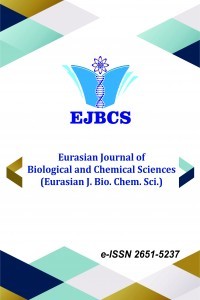Alternanthera reineckii Briq.’nin doku kültürü çalışmaları için yüzey sterilizasyonunun optimizasyonu
Boğum eksplantı, çoğaltım, H2O2, rejenerasyon, sterilizasyon
Optimization of surface sterilization of Alternanthera reineckii for tissue culture studies
Nodal explant, propagation, H2O2, regeneration, sterilization,
___
- Akshatha MD, Kavadikeri S, Rao NN 2018. In vitro micropropagation and antioxidant assay in Colocasia esculenta. Plant Tissue Cult Biotechnol 28(2):183-190.
- Chalenko YV, Cherednichenko MY 2017. In vitro introduction and cultivation of aquatic plant Alternanthera reineckii Briq. The 3rd International Symposium on EuroAsian Biodiversity, 05-08 July 2017, Minsk - Belarus.
- Dogan M 2017. Multiple shoot regeneration from shoot tip and nodal explants of Rotala rotundifolia (Buch-Ham. ex Roxb) Koehne. Ant J Bot 1(1,2): 4-8.
- Dogan M 2018a. In vitro micropropagation from nodal explants of the medicinal plant Lysimachia nummularia L.. KSU J Agric Nat 21(6): 875-881.
- Dogan M 2018b. In vitro shoot regeneration of Limnophila aromatica (lamk.) Merr. from nodal and internodal explants. Iğdır Univ. J. Inst. Sci. & Tech., 8(3): 77-84.
- Dogan M 2019. Callus formation from full leaf and leaf parts of Rotala rotundifolia (Buch-Ham. ex Roxb) Koehne. Acta Biologica Turcica 32(2): 78-83.
- Ghasheem AL, Stănică N, Petıcılă FAG, Venat O, 2018. In vitro effect of various sterilization techniques on peach (Prunus persica (L.) Batsch) explants. Scientific Papers, 227.
- Halim MA, Alam MF, Rahman MH, Hossain MB, Uddin MB 2016. Sterilization process for in vitro regeneration of Stevia (Stevia rebundiana Bertoni). Int J Bus Soc Sci Res 4(4): 320-323.
- Hussain A, Qarshi IA, Nazir H, Ullah I 2012. Plant Tissue Culture Current Status and Opportunities. In Recent advances in plant in vitro culture. IntechOpen.
- Karaoğlu C 2010. Soğanlı bitkiler ve in vitro hızlı çoğaltım. Tarla Bitk Merk Araştırma Enstitüsü Derg 19 (1-2): 24-29.
- Karaoğlu C, Çöçü S, İpek A, Parmaksız İ, Uranbey S, Sarıhan EO, Arslan N, Kaya MD, Sancak C, Özcan S, Gürbüz B, Mirici S, Er C, Khawar KM 2006. In vitro micropropagation of saffron. Proceedings of The 2nd International Symposium on Saffron Biology and Technology, Acta Horticulture, Number 739: 223-227.
- Leifert C, Ritchie JY, Waites WM 1991. Contaminants of plant-tissue and cell cultures. World J Microbiol Biotechnol 7: 452-469.
- Misra AN, Misra M, 2012. Sterilisation techniques in plant tissue culture. Life Science Center, Fakir Mohan University, Balasore-756020.
- Murashige T, Skoog F 1962. A revised medium for rapid growth and bioassays with tobacco tissue cultures. Physiol Plant 15: 473-497.
- Oyebanji OB, Nweke O, Odebunmi O, Galadima NB, Idris MS, Nnodi UN, Afolabi AS, Ogbadu GH 2009. Simple, effective and economical explant-surface sterilization protocol for cowpea, rice and sorghum seeds. Afr J Biotechnol 8(20): 5395-5399.
- Ozdemir FA, Gur N 2018. In vitro propagation of cataloglu apricot (Prunus armeniaca L.) cultivar using apical node as explant. Prog Nutr 20(1-S) :176-181.
- Roberto T, Francesca M 2011. Sustainable sourcing of natural food ingredientsby plant cell cultures. Agro Food Industry Hi Tech, 22: 26-28.
- Ryan RP, Germaine K, Franks A, Ryan DJ, Dowling DN 2008. Bacterial endophytes: recent developments and applications. FEMS Microbiol Letts 278: 1-9.
- Sharma S, Rathi N, Kamal B, Pundir D, Kaur B, Arya S 2010. Conservation of biodiversity of highly important medicinal plants of India through tissue culture technology- a review. Agric Biol J N Am 1(5): 827-833.
- Sülü SM, Bozkurt İA, Soylu S, 2016. Bitki büyüme düzenleyici ve biyolojik mücadele etmeni olarak bakteriyel endofitler. MKU Ziraat Fakültesi Derg 21(1): 103-111.
- Yayın Aralığı: Yılda 2 Sayı
- Başlangıç: 2018
- Yayıncı: Muhammet DOĞAN
Meliha KOLDEMİR GÜNDÜZ, Mehtap ÇEVİK, Penbe ÇAĞATAY, Belgin SÜSLEYİCİ
Beta Glucosidase Recognition By Imprinted Polyacrylamide Hydrogels
Mervecan SEVİLDİK, Ayşe DİNÇER, Tülin AYDEMİR
Ayşen AKTÜRK, Büşra CENİK, Zeliha AYDOĞDU, Melek EROL TAYGUN, Funda KARBANCIOĞLU GÜLER, Sadriye KÜÇÜKBAYRAK
